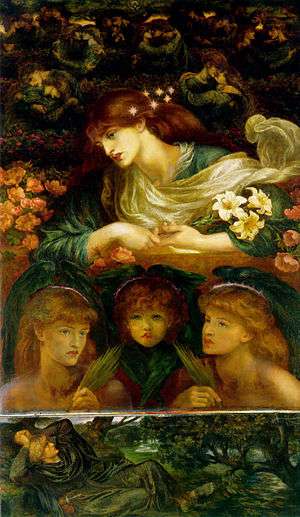La Damoiselle élue
| La Damoiselle élue | |
|---|---|
| Cantata by Claude Debussy | |
 Dante Gabriel Rossetti, The Blessed Damozel (1878) | |
| Catalogue | L. 62 |
| Text | "The Blessed Damozel" by Dante Gabriel Rossetti |
| Language | French (translated) |
| Composed | 1887–88 |
| Dedication | Paul Dukas |
| Performed | 8 April 1893 |
| Published | 1892 |
| Scoring |
|
La Damoiselle élue (The Blessed Damozel), L. 62, is a cantata for two soloists, female choir, and orchestra, composed by Claude Debussy in 1887–1889 based on a text by Dante Gabriel Rossetti. It premiered in Paris in 1893.
History
Claude Debussy was interested in the symbolist movement and later took inspiration from a poem by Stéphane Mallarmé for his Prélude à l'après-midi d'un faune (1894). Reading an anthology of English poetry translated by Gabriel Sarrazin, "Poètes modernes d’Angleterre" (1883) gave Debussy the idea of composing a cantata on the poem "The Blessed Damozel" (1850) by Pre-Raphaelite poet and painter Dante Gabriel Rossetti.[1] Debussy had probably not seen Rossetti's painting of the same title, but other pre-Raphaelite illustrations with a focus on "a new type of feminine beauty".[1] He completed the piece in 1889.[1] In a letter to André Poniatowski dated 9 September 1892, he confided that he had wanted to compose "a little oratorio in a little pagan mystical note".[2] The work is dedicated to composer Paul Dukas. Debussy sent his music score to the Académie des beaux-arts as an entry for the Prix de Rome.[3] The score for voice and piano was published in 1892.
La Damoiselle élue belongs to the same period of composition as the Cinq poèmes de Charles Baudelaire, when Debussy was influenced by the music of Richard Wagner. The composer chose to distance himself from this musical influence, while remaining faithful to symbolist literature, when composing his opera Pelléas et Mélisande in the 1890s. Patterns such as fleur-de-lys returned to his stage music for Le Martyre de saint Sébastien (1910–1911).[1]
La Damoiselle élue premiered in Paris at the société Nationale de Musique on 8 April 1893[3], sung by Julia and Thérèse Robert, and conducted by Jean Gabriel-Marie.[2][4] It was the first of Debussy's works for orchestra to be performed.[1] The premiere was a success, and music critic Pierre Lalo wrote in Le Temps: "Such are the grace and delicacy of his taste that all his audacities are welcome" ("telles sont la grâce et la délicatesse de son goût que toutes ses audaces sont heureuses").[5] Some critics, however, reproached the work as being "very sensual and decadent" ("très sensuelle et décadente").[6]
Debussy revised his orchestration for the piece in 1902.[3]
Synopsis
La Damoiselle élue s’appuyait sur la barrière d’or du ciel (La Damoiselle élue leaned on the golden barrier of heaven).[7]
Du haut du paradis, une jeune fille se lamente sur l'absence de son amant. Sur Terre, ce dernier croit sentir sa présence (From the heights of paradise, a young girl laments the absence of her lover. On Earth, the latter believes he feels her presence).[8]
The performance lasts some twenty minutes.
Bibliography
- Richard Langham, "La Genèse de La Damoiselle élue", Cahiers Debussy, 1980–1981, No 4-5.
Discography
- Bidu Sayão and Rosalind Nadell, with the Philadelphia Orchestra conducted by Eugene Ormandy, 1942 (Columbia).[9][10]
- Madeleine Gorge and Jacqueline Joly, with the Orchestre national de la radiodiffusion française conducted by Désiré-Émile Inghelbrecht, 1950.[11]
- Jeanne Deroubaix and Suzanne Danco, with the Choir and the WDR Symphony Orchestra Cologne conducted by Marcel Couraud, 1957.[12]
- Carol Smith and Victoria de los Ángeles, with the Boston Symphony Orchestra conducted by Charles Munch, 1976 (RCA Victor).[13]
- Jocelyne Taillon and Barbara Hendricks, with the Orchestre de Paris conducted by Daniel Barenboim, 1980 (Deutsche Grammophon).[14]
- Glenda Maurice and Ileana Cotrubas, with the Stuttgart Radio Symphony Orchestra conducted by Gary Bertini, 1982 (Orfeo).[15]
- Brigitte Balleys and Maria Ewing, with the London Symphonic Orchestra conducted by Claudio Abbado, 1987 (Deutsche Grammophon).[16]
- Paula Rasmussen and Dawn Upshaw, with the Los Angeles Philharmonic conducted by Esa-Pekka Salonen, 1994 (Sony).[17]
- Sylvie Sullé and Mireille Delunsch, with the Orchestre national de Lille conducted by Jean-Claude Casadesus, 1995 (Harmonia mundi).[18]
References
- 1 2 3 4 5 Caroline Rae, La Damoiselle élue, Claude Debussy, website of the London Philharmonic Orchestra, accessdate 13 June 2016.
- 1 2 Anne Penesco, Itinéraires de la musique française: théorie, pédagogie et création, Presses Universitaires de Lyon, 1996, p. 192.
- 1 2 3 La Damoiselle élue. FL 69, website of the bibliothèque nationale de France
- ↑ La Damoiselle élue, IMSLP.
- ↑ Ariane Charton, Debussy, Éditions Gallimard folio biographies, 2012.
- ↑ Eric Frederick Jensen, Debussy, Oxford University Press, 2014, (p. 158).
- ↑ La Damoiselle élue, Centre de documentation Claude Debussy, 2007.
- ↑ Laurence Roussillon-Constanty, Méduse au miroir: esthétique romantique de Dante Gabriel Rossetti, ELLUG, 2008, (pp. 70–71).
- ↑ Bidu Sayao - La Damoiselle Elue, Opera Arias Arkivmusic
- ↑ OCLC 671658965
- ↑ 9408841 discogs
- ↑ 9408841 Claude Debussy, La damoiselle élue, L 62, Suzanne Danco, Jeanne Deroubaix, Frauen des Kölner Rundfunkchor, Kölner Rundfunk-Sinfonie-Orchester, Marcel Couraud, 3.-6.07.1957 renegagnaux.ch
- ↑ OCLC 916463378
- ↑ OCLC 50085203
- ↑ OCLC 785894329
- ↑ OCLC 690137799
- ↑ 1014953 discogs
- ↑ Interview avec Mireille Delunsch / Discographie (in French) odb-opera.com
External links
- Partition chant et piano on the site of the bibliothèque nationale
- La Damoiselle élue on La Revue Musicale, Volume 3, Number 1, January 1903 PDF
- La Damoiselle élue lyrics
- La Damoiselle élue on Discogs
- Claude Debussy – La damoiselle élue on YouTube
- Debussy (L') Enfant Prodigue; (La) Damoiselle Elue Gramophone
- Showing all editions for 'La damoiselle élue' WorldCat